- Home
- Diana Wynne Jones
Castle in the Air Page 3
Castle in the Air Read online
Page 3
In which Flower-in-the-Night discovers several important facts.
Abdullah carefully tied the carpet around the roof pole again and went out into the Bazaar, where he sought out the booth of the most skillful of the various artists who traded there.
After the usual opening courtesies, in which Abdullah called the artist prince of the pencil and enchanter with chalks and the artist retorted by calling Abdullah cream of customers and duke of discernment, Abdullah said, “I want drawings of every size, shape, and kind of man that you have ever seen. Draw me kings and paupers, merchants and workmen, fat and thin, young and old, handsome and ugly, and also plain average. If some of these are kinds of men that you have never seen, I require you to invent them, O paragon of the paintbrush. And if your invention fails, which I hardly think is likely, O aristocrat of artists, then all you need do is turn your eyes outward, gaze, and copy!”
Abdullah flung out one arm to point to the teeming, rushing crowds shopping in the Bazaar. He was moved almost to tears at the thought that this everyday sight was something Flower-in-the-Night had never seen.
The artist drew his hand dubiously down his straggly beard. “For sure, noble admirer of mankind,” he said, “this I can do easily. But could the jewel of judgment perhaps inform this humble draftsman what these many portraits of men are needed for?”
“Why should the crown and diadem of the drawing board wish to know this?” Abdullah asked, rather dismayed.
“Assuredly, the chieftain of customers will understand that this crooked worm needs to know what medium to use,” the artist replied. In fact, he was simply curious about this most unusual order. “Whether I paint in oils on wood or canvas, in pen upon paper or vellum, or even in fresco upon a wall depends on what this pearl among patrons wishes to do with the portraits.”
“Ah, paper, please,” Abdullah said hastily. He had no wish to make his meeting with Flower-in-the-Night public. It was clear to him that her father must be a very rich man who would certainly object to a young carpet merchant’s showing her other men besides this Prince of Ochinstan. “The portraits are for an invalid who has never been able to walk abroad as other men do.”
“Then you are a champion of charity,” said the artist, and he agreed to draw the pictures for a surprisingly small sum. “No, no, child of fortune, do not thank me,” he said when Abdullah tried to express his gratitude. “My reasons are three. First, I have laid by me many portraits which I do for my own pleasure, and to charge you for those is not honest since I would have drawn them anyway. Second, the task you set is ten times more interesting than my usual work, which is to do portraits of young women or their bridegrooms, or of horses and camels, all of whom I have to make handsome, regardless of reality; or else to paint rows of sticky children whose parents wish them to seem like angels—again regardless of reality. And my third reason is that I think you are mad, my most noble of customers, and to exploit you would be unlucky.”
It became known almost immediately, all over the Bazaar, that young Abdullah, the carpet merchant, had lost his reason and would buy any portraits that people had for sale.
This was a great nuisance to Abdullah. For the rest of that day he was constantly being interrupted by persons arriving with long and flowery speeches about this portrait of their grandmother which only poverty would induce them to part with; or this portrait of the Sultan’s racing camel which happened to fall off the back of a cart; or this locket containing a picture of their sister. It took Abdullah much time to get rid of these people—and on several occasions he did actually buy a painting or drawing if the subject was a man. That, of course, kept people coming.
“Only today. My offer extends only until sunset today,” he told the gathering crowd at last. “Let all with a picture of a man for sale come to me an hour before sunset and I will buy. But only then.”
This left him a few hours of peace in which to experiment with the carpet. He was wondering by now if he was right to think that his visit to the garden had been any more than a dream. For the carpet would not move. Abdullah had naturally tested it after breakfast by asking it to rise up two feet again, just to prove that it still would. And it simply lay on the floor. He tested it again when he came back from the artist’s booth, and still it just lay there.
“Perhaps I have not treated you well,” he said to it. “You have remained with me faithfully, in spite of my suspicions, and I have rewarded you by tying you around a pole. Would you feel better if I let you lie free on the floor, my friend? Is that it?”
He left the carpet on the floor, but it still would not fly. It might have been any old hearthrug.
Abdullah thought again, in between the times when people were pestering him to buy portraits. He went back to his suspicions of the stranger who had sold him this carpet and to the enormous noise that just happened to break out in Jamal’s stall at the precise moment when the stranger ordered the carpet to rise. He recalled that he had seen the man’s lips move both times but had not heard all that was said.
“That is it!” he cried out, smashing his fist into his palm. “A code word needs to be spoken before it will move, which for reasons of his own—no doubt highly sinister—this man withheld from me. The villain! And this word I must have spoken in my sleep.”
He rushed to the back of his booth and rummaged out the tattered dictionary he had once used at school. Then, standing on the carpet, he cried out, “Aardvark! Fly, please!”
Nothing happened, either then or for any word beginning with A. Doggedly Abdullah went on to B, and when that did no good, he went on again, through the whole dictionary. With the constant interruptions from portrait sellers, this took him some time. Nevertheless, he reached zymurgy in the early evening without the carpet’s having so much as twitched.
“Then it has to be a made-up word or a foreign one!” he cried out feverishly. It was that or believe that Flower-in-the-Night was only a dream after all. Even if she was real, his chances of getting the carpet to take him to her seemed slimmer by the minute. He stood there uttering every strange sound and every foreign word he could think of, and still the carpet made no move of any kind.
Abdullah was interrupted again an hour before sundown by a large crowd gathering outside, carrying bundles and big flat packages. The artist had to push his way through the crowd with his portfolio of drawings. The following hour was hectic in the extreme. Abdullah inspected paintings, rejected portraits of aunts and mothers, and beat down huge prices asked for bad drawings of nephews. In the course of that hour he acquired, beside the hundred excellent drawings from the artist, eighty-nine further pictures, lockets, drawings, and even a piece of a wall with a face daubed on it. He also parted with almost all the money he had left over after buying the magic carpet—if it was magic. It was dark by the time he finally convinced the man who claimed that the oil painting of his fourth wife’s mother was enough like a man to qualify that this was not the case and pushed him out of the booth. He was by then too tired and wrought up to eat. He would have gone straight to bed had not Jamal—who had been doing a roaring trade selling snacks to the waiting crowd—arrived with tender meat on a skewer.
“I don’t know what has got into you,” Jamal said. “I used to think you were normal. But mad or not, you must eat.”
“There is no question of madness,” Abdullah said. “I have simply decided to go into a new line of business.” But he ate the meat.
At last he was able to pile his 189 pictures onto the carpet and lie down among them.
“Now listen to this,” he told the carpet. “If by some lucky chance I happen to say your command word in my sleep, you must instantly fly with me to the night garden of Flower-in-the-Night.” That seemed the best he could do. It took him a long time to get to sleep.
He woke to the dreamy fragrance of night flowers and a hand gently prodding him. Flower-in-the-Night was leaning over him. Abdullah saw she was far lovelier than he had been remembering her.
“You really did
bring the pictures!” she said. “You are very kind.”
I did it! Abdullah thought triumphantly. “Yes,” he said. “I have one hundred and eighty-nine kinds of men here. I think this ought to give you at least a general idea.”
He helped her unhook a number of the golden lamps and put them in a ring beside the bank. Then Abdullah showed her the pictures, holding them under a lamp first and then leaning them up against the bank. He began to feel like a pavement artist.
Flower-in-the-Night inspected each man as Abdullah showed him, absolutely impartially and with great concentration. Then she picked up a lamp and inspected the artist’s drawings all over again. This pleased Abdullah. The artist was a true professional. He had drawn men exactly as Abdullah asked, from a heroic and kingly person evidently taken from a statue, to the hunchback who cleaned shoes in the Bazaar, and had even included a self-portrait halfway through.
“Yes, I see,” Flower-in-the-Night said at last. “Men do vary a lot, just as you said. My father is not at all typical, and neither are you, of course.”
“So you admit I am not a woman?” said Abdullah.
“I am forced to do so,” she said. “I apologize for my error.” Then she carried the lamp along the bank, inspecting certain of the pictures a third time.
Abdullah noticed, rather nervously, that the ones she had singled out were the handsomest. He watched her leaning over them with a small frown on her forehead and a curly tendril of dark hair straying over the frown, looking thoroughly intent. He began to wonder what he had started.
Flower-in-the-Night collected the pictures together and stacked them neatly in a pile beside the bank. “It is just as I thought,” she said. “I prefer you to every single one of these. Some of these look far too proud of themselves, and some look selfish and cruel. You are unassuming and kind. I intend to ask my father to marry me to you, instead of to the Prince in Ochinstan. Would you mind?”
The garden seemed to swirl around Abdullah in a blur of gold and silver and dusky green. “I—I think that might not work,” he managed to say at last.
“Why not?” she asked. “Are you married already?”
“No, no,” he said. “It is not that. The law allows a man to have as many wives as he can afford, but—”
The frown came back to Flower-in-the-Night’s forehead. “How many husbands are women allowed?” she asked.
“Only one!” Abdullah said, rather shocked.
“That is extremely unfair,” Flower-in-the-Night observed musingly. She sat on the bank and thought. “Would you say it is possible that the Prince in Ochinstan has some wives already?”
Abdullah watched the frown grow on her forehead and the slender fingers of her right hand tapping almost irritably on the turf. He knew he had indeed started something. Flower-in-the-Night was discovering that her father had kept her ignorant of a number of important facts. “If he is a prince,” Abdullah said rather nervously, “I think it entirely possible that he has quite a number of wives. Yes.”
“Then he is being greedy,” Flower-in-the-Night stated. “This takes a weight off my mind. Why did you say that my marrying you might not work? You mentioned yesterday that you are a prince as well.”
Abdullah felt his face heating up, and he cursed himself for babbling out his daydream to her. Though he told himself that he had had every reason to believe he was dreaming when he told her, this did not make him feel any better. “True. But I also told you I was lost and far from my kingdom,” he said. “As you might conjecture, I am now forced to make my living by humble means. I sell carpets in the Bazaar of Zanzib. Your father is clearly a very rich man. This will not strike him as a fitting alliance.”
Flower-in-the-Night’s fingers drummed quite angrily. “You speak as if it is my father who intends to marry you!” she said. “What is the matter? I love you. Do you not love me?”
She looked into Abdullah’s face as she said this. He looked back into hers, into what seemed an eternity of big dark eyes. He found himself saying, “Yes.” Flower-in-the-Night smiled. Abdullah smiled. Several more moonlit eternities went by.
“I shall come with you when you leave here,” Flower-in-the-Night said. “Since what you say about my father’s attitude to you could well be true, we must get married first and tell my father afterward. Then there is nothing he can say.”
Abdullah, who had had some experience of rich men, wished he could be sure of that. “It may not be quite that simple,” he said. “In fact, now I think about it, I am certain our only prudent course is to leave Zanzib. This ought to be easy, because I do happen to own a magic carpet. There it is, up on the bank. It brought me here. Unfortunately it needs to be activated by a magic word which I seem only able to say in my sleep.”
Flower-in-the-Night picked up a lamp and held it high so that she could inspect the carpet. Abdullah watched, admiring the grace with which she bent toward it. “It seems very old,” she said. “I have read about such carpets. The command word will probably be a fairly common word pronounced in an old way. My reading suggests these carpets were meant to be used quickly in an emergency, so the word will not be anything too out of the way. Why do you not tell me carefully everything you know about it? Between us we ought to be able to work it out.”
From this Abdullah realized that Flower-in-the-Night—if you discounted the gaps in her knowledge—was both intelligent and very well educated. He admired her even more. He told her, as far as he knew them, every fact about the carpet, including the uproar at Jamal’s stall which had prevented him hearing the command word.
Flower-in-the-Night listened and nodded at each new fact. “So,” she said, “let us leave aside the reason why someone should sell you a proven magic carpet and yet make sure you could not use it. That is such an odd thing to do that I feel sure we should think about it later. But let us first think about what the carpet does. You say it came down when you ordered it to. Did the stranger speak then?”
She had a shrewd and logical mind. Truly he had found a pearl among women, Abdullah thought. “I am quite sure he said nothing,” he said.
“Then,” said Flower-in-the-Night, “the command word is only needed to start the carpet flying. After that I see two possibilities: first, that the carpet will do as you say until it touches ground anywhere or, second, that it will in fact obey your command until it is back at the place where it first started—”
“That is easily proved,” Abdullah said. He was dizzy with admiration for her logic. “I think the first possibility is the correct one.” He jumped on the carpet and cried experimentally, “Up, and back to my booth!”
“No, no! Don’t! Wait!” Flower-in-the-Night cried out at the same instant.
But it was too late. The carpet whipped up into the air and then away sideways with such speed and suddenness that Abdullah was first thrown over on his back, with all the breath knocked out of him, and then found himself hanging half off over its frayed edge at what seemed a terrifying height in the air. The wind of its movement took his breath away as soon as he did manage to breathe. All he could do was to claw frantically for a better grip on the fringe at one end. And before he could work his way back on top of it, let alone speak, the carpet plunged downward—leaving Abdullah’s newly gained breath high in the air above—barged its way through the curtains of the booth—half smothering Abdullah in the process—and landed smoothly—and very finally—on the floor inside.
Abdullah lay on his face, gasping, with dizzy memories of turrets whirling past him against a starry sky. Everything had happened so quickly that at first all he could think of was that the distance between his booth and the night garden must be quite surprisingly short. Then, as his breath did at last come back, he wanted to kick himself. What a stupid thing to have done! He could at least have waited until Flower-in-the-Night had had time to step on the carpet, too. Now Flower-in-the-Night’s own logic told him that there was no way to get back to her but to fall asleep again and, once more, hope he chanced to say the command
word in his sleep. But as he had already done it twice, he was fairly sure that he would. He was even more certain that Flower-in-the-Night would work this out for herself and wait in the garden for him. She was intelligence itself—a pearl among women. She would expect him back in an hour or so.
After an hour of alternately blaming himself and praising Flower-in-the-Night, Abdullah did manage to fall asleep. But alas, when he woke he was still facedown on the carpet in the middle of his own booth. Jamal’s dog was barking outside, which was what had woken him up.
“Abdullah!” shouted the voice of his father’s first wife’s brother’s son. “Are you awake in there?”
Abdullah groaned. This was all he needed.
Chapter 4
Which concerns marriage and prophecy.
Abdullah could not think what Hakim was doing there. His father’s first wife’s relatives usually only came near him once a month, and they had paid that visit to him two days ago. “What do you want, Hakim?” he shouted wearily.
“To speak to you, of course!” Hakim shouted back. “Urgently!”

 Fire and Hemlock
Fire and Hemlock Reflections: On the Magic of Writing
Reflections: On the Magic of Writing The Game
The Game The Crown of Dalemark
The Crown of Dalemark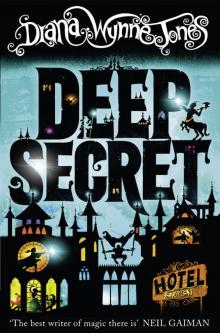 Deep Secret
Deep Secret Witch Week
Witch Week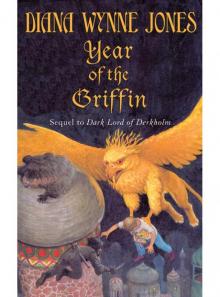 Year of the Griffin
Year of the Griffin Wild Robert
Wild Robert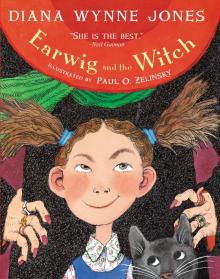 Earwig and the Witch
Earwig and the Witch Witch's Business
Witch's Business Dogsbody
Dogsbody Caribbean Cruising
Caribbean Cruising Cart and Cwidder
Cart and Cwidder Conrad's Fate
Conrad's Fate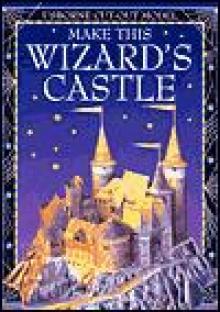 Howl's Moving Castle
Howl's Moving Castle The Spellcoats
The Spellcoats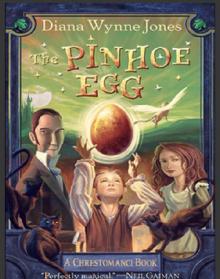 The Pinhoe Egg
The Pinhoe Egg Drowned Ammet
Drowned Ammet The Ogre Downstairs
The Ogre Downstairs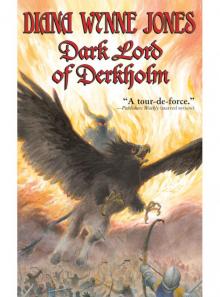 Dark Lord of Derkholm
Dark Lord of Derkholm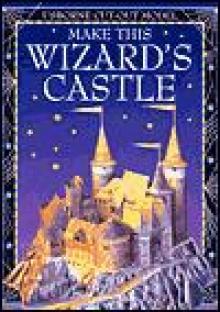 Castle in the Air
Castle in the Air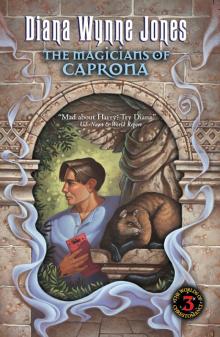 The Magicians of Caprona
The Magicians of Caprona A Tale of Time City
A Tale of Time City The Lives of Christopher Chant
The Lives of Christopher Chant The Magicians of Caprona (UK)
The Magicians of Caprona (UK)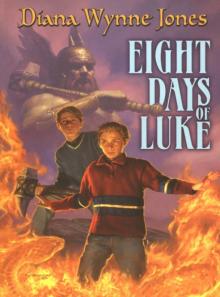 Eight Days of Luke
Eight Days of Luke Conrad's Fate (UK)
Conrad's Fate (UK) A Sudden Wild Magic
A Sudden Wild Magic Mixed Magics (UK)
Mixed Magics (UK)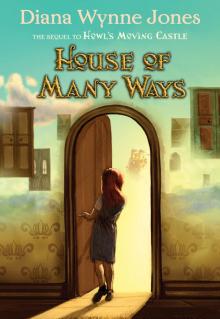 House of Many Ways
House of Many Ways Witch Week (UK)
Witch Week (UK) The Homeward Bounders
The Homeward Bounders The Merlin Conspiracy
The Merlin Conspiracy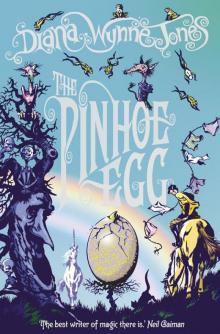 The Pinhoe Egg (UK)
The Pinhoe Egg (UK)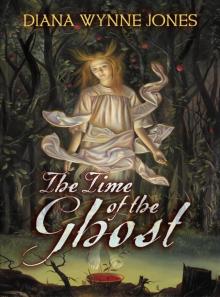 The Time of the Ghost
The Time of the Ghost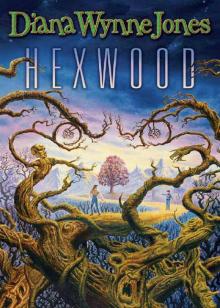 Hexwood
Hexwood Enchanted Glass
Enchanted Glass The Crown of Dalemark (UK)
The Crown of Dalemark (UK)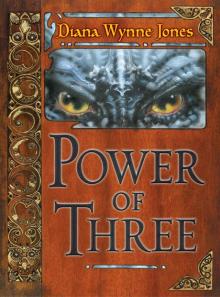 Power of Three
Power of Three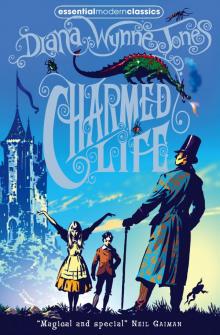 Charmed Life (UK)
Charmed Life (UK)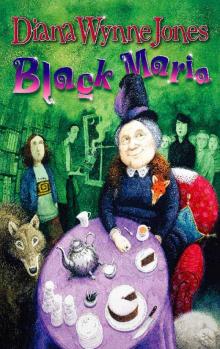 Black Maria
Black Maria The Islands of Chaldea
The Islands of Chaldea Cart and Cwidder (UK)
Cart and Cwidder (UK) Drowned Ammet (UK)
Drowned Ammet (UK) Charmed Life
Charmed Life The Spellcoats (UK)
The Spellcoats (UK)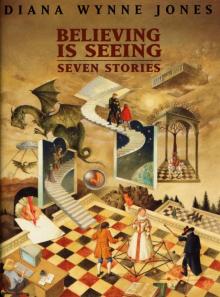 Believing Is Seeing
Believing Is Seeing Samantha's Diary
Samantha's Diary Aunt Maria
Aunt Maria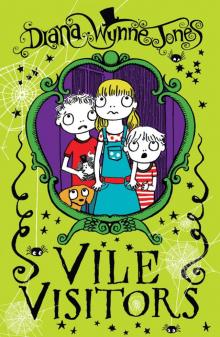 Vile Visitors
Vile Visitors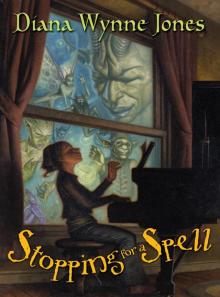 Stopping for a Spell
Stopping for a Spell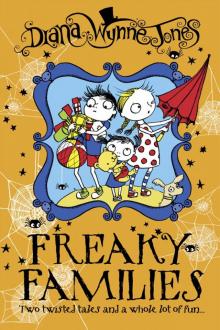 Freaky Families
Freaky Families Unexpected Magic
Unexpected Magic Reflections
Reflections Enna Hittms
Enna Hittms Mixed Magics: Four Tales of Chrestomanci
Mixed Magics: Four Tales of Chrestomanci